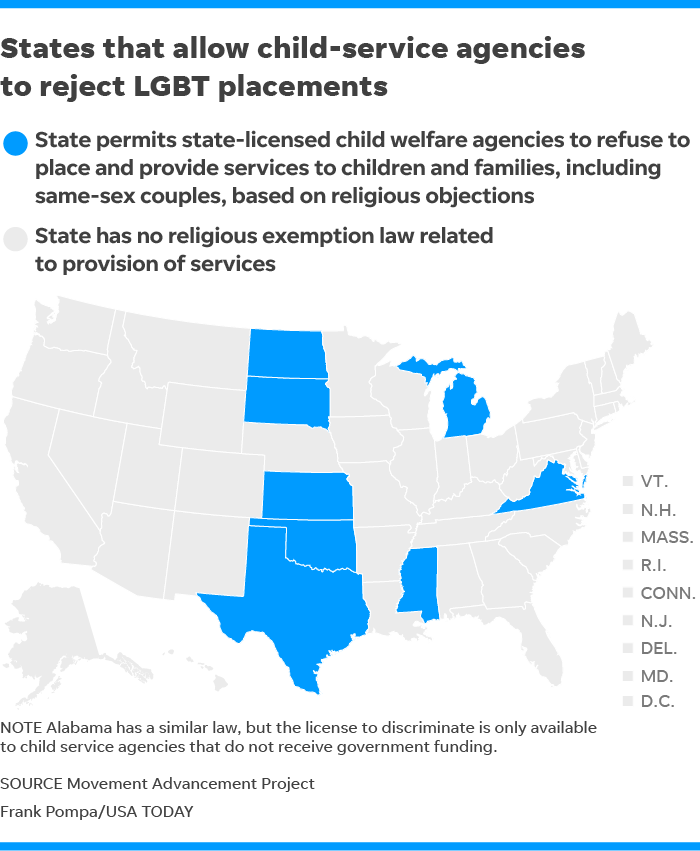3 yrs After A Gay Marriage Ruling New Bills Threaten LGBT Families
[Susan Miller, USA TODAY]
A Supreme Court ruling sanctioning same-sex marriage in 2015 was hailed as a milestone moment that would see discrimination crumble and equality triumph for LGBT couples — and for their children.
But in the past three years, those parents and kids have faced a brewing backlash that threatens everything from health benefits to a couple’s ability to adopt.
Two states — Kansas and Oklahoma — passed legislation in recent weeks that allows state-licensed child welfare agencies to cite religious beliefs for not placing children in LGBT homes, a troubling trend for LGBT advocates.
“We have to acknowledge that marriage equality was a huge victory for security and stability” for LGBT families, said Naomi Goldberg, policy director for the Movement Advancement Project (MAP), which released a report Monday documenting ways the 2015 ruling is being undercut and the consequences for kids. “But the landscape remains uncertain. Families have to think about ways they may or may not be recognized: when they travel, go to the doctor, go to a restaurant.”
Goldberg points to a Gallup survey released two weeks ago that shows more than two-thirds of Americans now back same-sex marriage — the highest level Gallup has recorded in the more than 20 years it has been surveying Americans on the issue.
In many families and communities, support for LGBT families flourishes, but “the gap is with legislators,” she said.
The report by MAP, a think tank that researches and analyzes laws with LGBT implications, and co-authored by the Family Equality Council, which has been working with LGBT-headed families for nearly 40 years, cites a refusal to recognize LGBT families by some government officials, state legislators, and even courts.
The result puts children in peril on many levels, the report says: If a parent-child relationship is not legally cemented, children could be denied health insurance or a parent may not be able to make medical decisions.
Birth certificates to divorces
Efforts to undermine the 2015 ruling have played out across the nation in the past three years.
• Arkansas was among several states that initially refused to place two married same-sex parents on a birth certificate until ordered to do so by the Supreme Court in 2017.
• In Mississippi, a lower court refused to award parental rights in a divorce case to the non-biological mother of a 7-year-old boy conceived using an anonymous sperm donor. Eventually, the state Supreme Court affirmed the mother’s rights.
• In Texas, Houston is fighting for rights for its gay workers after the state Supreme Court overturned a lower court’s decision favoring benefits for legal spouses of city employees, which could include same-sex spouses. The state Supreme Court action is alarming, Goldberg said because it suggests the court didn’t think the landmark 2015 decision legalizing same-sex marriage also extended to employment benefits.
Religious exemptions
Supporters of religious exemptions — laws that let people, churches, non-profits and sometimes businesses cite religious beliefs as a reason to not comply with a law — say exemptions are an American right, dating to the Revolution. The laws "teach us how to live in a pluralistic society that recognizes we don’t all believe the same thing," said Bruce Hausknecht, judicial analyst at Focus on the Family, a Christian conservative organization that opposes same-sex marriage.
Faith-based child welfare agencies, for example, "fit well into that dynamic," he said. "Religious exemptions don’t harm the overall mission of connecting families with children in need because faith-based agencies comprise only a small percentage of private agencies that work in this area."
But exemption laws loom large over the daily lives of LGBT families, according to the MAP report. Currently, 21 states have some type of religious exemption laws on the books.
“Religion is an important value; it’s protected under the Constitution,” Goldberg said. “But we also have an American value of not discriminating and treating people fairly.”
Only 19 states and the District of Columbia have protections from discrimination in public accommodations — meaning that in most places in the country, LGBT parents and kids can be refused service or booted from a business by someone who cites a religious belief.
A 2018 proposed federal rule by the Health and Human Services Department that would let health care providers decide what procedures to perform and what patients to treat based on their religious beliefs adds more firepower.
“What we are seeing really privileges doctors’ religious beliefs over a patient’s best interest,” Goldberg said, noting that if an LGBT person lives in a rural area with only one or two doctors the individual could not have access to health care at all.
Love to give
Kansas and Oklahoma joined six other states that now allow taxpayer-funded child service agencies to refuse to place children or provide services to families — including same-sex couples — if doing so would conflict with their religion.
Todd Vesely, 52, and Joel Busch, 54, know the sting of discrimination well. They endured nearly an eight-year odyssey to open their home to kids in need when they decided to become foster parents in Nebraska in 2007.
The couple took 10 weeks of classes, passed background checks, bought a bigger house in Lincoln. Their dream was shattered when they were denied a license because they're gay.
“We were totally devastated,” Vesely said when they learned of a state policy that prohibited the Department of Health and Human Services from placing foster children with same-sex couples.
“Kids need a place to go … no matter what their problems are,” Busch said. “We offered a safe place.”
The two realized they were not alone and eventually filed suit with two other couples and the ACLU.
On the day that they married in Iowa in 2015, they testified before the Nebraska legislature about why they joined the suit. The legislature didn’t act, but the couple and the ACLU would not relent.
In August 2015, a court ruled in their favor. Nebraska appealed to the state Supreme Court, an appeal that was rejected by a justice who compared the state’s policy to “a sign reading Whites Only on the hiring office door.”
Veseley and Busch took another round of foster classes, and in December 2015 were finally licensed as foster parents.
The couple, who have fostered nine children, now also have an adopted son, 13.
“We’ve got so much love and caring” to offer, Vesely said. “A lot of these kids don’t have the ability to say I have someone who loves me on a daily basis.”
Susan Miller, USA TODAY



Comments